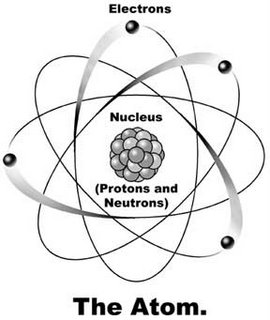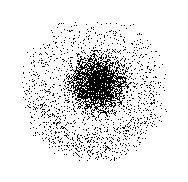We've Just Misplaced It
What would we do without our refrigerators, stoves, and cars, MP3 players, DVDs and USB drives? And the internet, with its easy access to brilliance and nonsense is absolutely amazing. Who in history, besides us, has been able to answer our own questions in a matter of seconds?
Science has come so far and has created so much; it’s easy to assume that everything worth understanding has already been explained. But though we accepted Johannes Kepler’s and Isaac Newton's explanations of the universe, Max Plank, Niels Bohr, Albert Einstein and so many other great minds came along who added to previous observations, suggested expanded explanations and shed new light on the universal configuration, or at least cast the configuration into a different part of the spectrum. Upon their knowledge, we have built new versions of structured reality; but that does not mean we have figured everything out!
Somehow, we have misplaced our sense of wonder and relinquished our claim to the mysterious. Though most of us do not know how to build a car, a television, satellite or cell phone or how to extract plasma from whole blood, we know that someone else does. Consequently, our day-to-day interaction with the “known” deflates our sense of mystery. We may be impressed with our technology, and served by it, and it may even seem mysterious when we do not possess an understanding of how it works; but it is not truly a mystery for it is created, or explicated, by human beings and we all know we could understand if we wanted to learn.
Mystery, Sweet Mystery
We need all the mystery that exists in our lives, but sometimes we stop seeing it. We have come to think that mystery is only that which has so far defied all rational definition. Then we either pursue explanation or dismiss it as non-reality. We want to know if there is life on other planets because we do not know. Are there really black holes and wormholes in space and is there some equation that might explain the whole universe? We go on archaeological digs and try to unearth the secrets of the past; and we examine ancient prophesies for clues to the future, but we assess everything through the mind of today.
Did Atlantis ever exist? Are UFOs real? Some were excited about the “face” on Mars and yet what would have happened if it turned out to have been deliberately carved by some ancient cosmological culture? The subject would quickly be snapped up by those in connected fields and for a few weeks or months it might be the prime focus of radio and television talk shows, debates and news and science magazines. But eventually we would feel that it had been “explained” and we'd all fall back into our routines, wondering, “Are there any more artefacts on Mars?” And if there were? “Well....is there anything on Europa???”
Solving a mystery, or at least finding reasonable explanations, always leads us to another level of mystery for our sense of incompleteness is also our evolutionary thrust. We have always wanted to know more, do more, experience more and we are forever asking “why” and “how”. Our search for the ultimate proof of God's existence has been continuous, as has our more recent search for the perfect equation that will explain the origin, and future, of the universe.
The Great Divide
Computers, carburetors, CAT scanners, nuclear reactors, guns, cloning, tailoring and dry masonry: all these objects and processes can be described or explained with equanimity for they mark their beginnings in the tangible world, as the creations or products of human observation and logic. If we lose our sense of mystery about our own inventions, we lose nothing; the understanding was ours for the learning. If the creations of our knowledge disappeared, we would still be here – able to create anew.
But trees, rocks, whales, water, lightning and crude oil, these and billions of others are wonders not of our own making and they retain their mystery even beyond our limited descriptions, applications and external observations, for they, like us, exist as complementary parts of this whole, we call the universe. Though we are capable of noticing, examining, experimenting, hypothesizing, and reasoning and concluding, we must constantly try to ensure that our interpretations of the natural world are offered with the greatest of caution. Description and supposition must never parade as resolution. And while we may decide how to explain photosynthesis or blood circulation, or offer ideas on why there's oil in the ground, we must be careful not to minimize the mystery that exists beyond our comprehension; for if the natural creations disappear, we will most decidedly disappear as well.
We must also be prudent with our own acceptance of explanations lest they strip away our awe and reverence for the things and processes they attempt to define. It is certainly not necessary to understand how the brain works in order to use it! Nor are we required to understand the “biology of prayer” for it to be effective.
- We can use our explanations to enhance our sense of mystery, reverence and awe, or to diminish it. The choice is ours.
On a television program about “life after death”, I heard a doctor explain that certain brain chemicals and body processes contribute to the perceptions often present in a near-death experience. Essentially, she suggested that this experience is not actually “real” but only a product of the mind. Such insinuations are unfortunate, for explaining our perceptions in terms of molecular or cellular function is no different from explaining the universe in terms of quantum physics or describing a whole tree in terms of all of its various cells, parts, and processes. Everything can be brought down to a subatomic level of explanation but that does not make anything less real.
We can describe how a rose grows, how photosynthesis works, how the capillary action of the roots and stem draw moisture to its leaves but our understanding doesn't include an explanation of how that particular combination of atoms combined to form a rose in the first place, without our help. Evolution? No. That only explains how the plant may have changed, not how the very first rose began, nor why. It is at this level that mystery remains and retains our awe while we make all sorts of educated guesses. When we appreciate the natural wonder and mystery in our lives, we want to tread carefully, and to keep our senses acute, our thoughts sharp and our emotions balanced, so that we may appreciate and understand life with as much perspicuity and pleasure as possible.
We must take care not to let our search for “explanation” reach the point at which we no longer feel a sense of wonder and awe, for it is that sense which keeps us humble long enough to take care with our observations and our explanations, lest they lead us to arrogance and despair. No species can survive if it continually repeats its errors and passes those mistakes along to subsequent generations.
- No words, equations or formulae equal what they describe.
- All “explanations” are merely fingers pointing at the awesome intricacies of life and saying, “Wow!”
Dr. Wilder Penfield, in his experiments on the brain could locate many areas that the brain controlled but could not find the “I” that controlled the dialogue.Next


